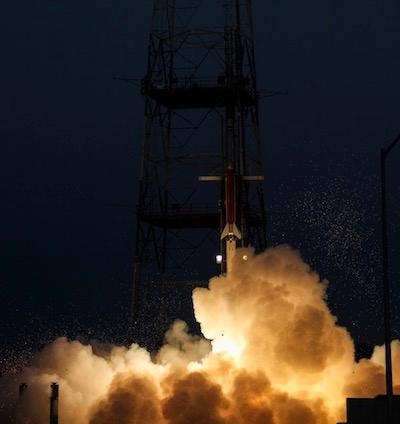Sat, Aug 18, 2018
About 100 Students Witness Suborbital Sounding Rocket Launch
Approximately 100 undergraduate university and community college students from across the United States were on hand to witness the launch of their experiments and technology demonstration projects on a NASA suborbital rocket at 6:13 a.m., Aug. 14, from NASA’s Wallops Flight Facility.

The Terrier-Improved Malemute sounding rocket launched as the sun was rising over the horizon and carried the student projects to an altitude of 98.5 miles.
After a brief ride into space, the payload carrying the students’ projects descended by parachute and landed in the Atlantic Ocean approximately 64 miles from the launch site. After recovery, the experiments will be returned to the students later in the day.
The eight experiments developed by students from across the country flew through the RockSat-X program in conjunction with the Colorado Space Grant Consortium. RockSat-X is the most advanced of NASA’s three-phase sounding rocket program for students. The RockOn launches are at the entry level, then progress to the intermedia level RockSat-C missions and then RockSat-X.
Also joining the RockSat-X students for the launch were about 50 students participating in the RockSat-XN program who are at Wallops preparing their experiment projects for flight. Similar to RockSat-X, XN includes experiments developed by students in the United States and those from universities in Norway and Japan.
XN is launching in January 2019 from the Andoya Space Center in Norway as part of an international project called the Grand Challenge Initiative (GCI) – Cusp.
In the GCI, NASA and United States scientists will join those from Norway, Japan, Canada and other countries during the next two years to investigate the region called the geomagnetic cusp — one of the few places on Earth with easy access to the electrically charged solar wind that pervades the solar system. The coordinated studies of near-Earth space at the Polar Regions will help understand the fundamental processes of our neighborhood in space; such knowledge is needed for safe navigation and communication near the poles, where solar activity can disrupt radio signals.
(Image provided with NASA news release)
More News
From 2023 (YouTube Version): Legacy of a Titan Robert (Bob) Anderson Hoover was a fighter pilot, test pilot, flight instructor, and air show superstar. More so, Bob Hoover was an i>[...]
Get The Latest in Aviation News NOW on Instagram Are you on Instagram yet? It's been around for a few years, quietly picking up traction mostly thanks to everybody's new obsession >[...]
Aero Linx: B-52H Stratofortress The B-52H Stratofortress is a long-range, heavy bomber that can perform a variety of missions. The bomber is capable of flying at high subsonic spee>[...]
Altimeter Setting The barometric pressure reading used to adjust a pressure altimeter for variations in existing atmospheric pressure or to the standard altimeter setting (29.92).>[...]
"Knowing that we play an active part in bettering people's lives is extremely rewarding. My team and I are very thankful for the opportunity to be here and to help in any way we ca>[...]
 Classic Aero-TV: Remembering Bob Hoover
Classic Aero-TV: Remembering Bob Hoover ANN FAQ: Follow Us On Instagram!
ANN FAQ: Follow Us On Instagram! ANN's Daily Aero-Linx (05.15.24)
ANN's Daily Aero-Linx (05.15.24) ANN's Daily Aero-Term (05.15.24):Altimeter Setting
ANN's Daily Aero-Term (05.15.24):Altimeter Setting Aero-News: Quote of the Day (05.16.24)
Aero-News: Quote of the Day (05.16.24)



